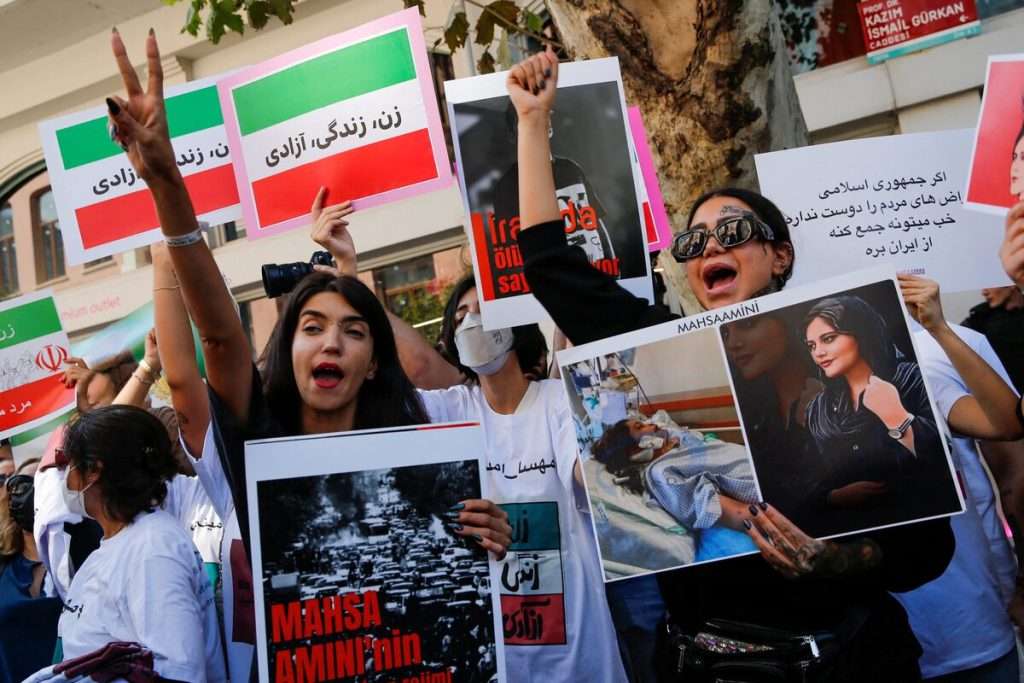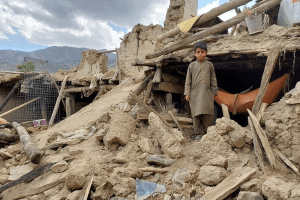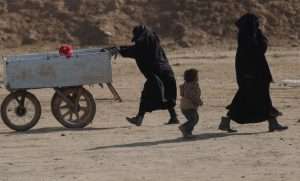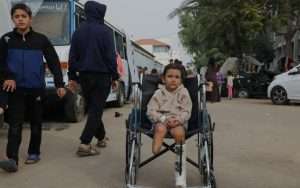Woman, Life, Freedom: The women imprisoned by Iran

Hasti Amiri, a women’s rights activist has been sentenced to three years in prison by a Tehran court, Iran International reported on August 18th. After protesting the death sentence of Kurdish political prisoner Pakhshan Azizi by holding her photo in public, Amiri has been charged with crimes related to propaganda against the state and appearing without a hijab in public.
In a post on her Instagram profile, the graduate law student announced that she received a two-year sentence and a 500 million rial fine, equal to $562, for “spreading falsehoods.” Amiri added that she received an additional year in prison for “propaganda against the state” and a fine of 30.3 million rial, equivalent to $37, for appearing unveiled in public.
Amiri did not attend the hearing, but it went ahead in her absence, according to Iran Wire. Amiri was first arrested in April. However, after posting bail of 1.5 million Iranian rial, she only spent one night in Evin Prison.
On Instagram, Amiri went on to reveal that the court had also imposed social punishments, including a two-year ban on international travel. She was also banned from gathering with political or social groups.

“When simply opposing the death penalty is considered propaganda against the state, then execution itself is a political tool of intimidation,” she wrote.
“Speaking about the situation of prisoners and Evin Prison has also been considered spreading falsehoods,” she added.
While studying at Tehran’s Allameh Tabataba’i University, Amiri was known for campaigning for students’ rights. She previously served seven months of a one-year prison sentence in 2022 for her advocacy against the death penalty and for women’s rights in Iran.
Amiri has repeatedly advocated against the death penalty and called for women’s rights in Iran. The ex-law student served seven months of a one-year prison sentence in 2022 and has been detained by the Iranian authorities multiple times.
On Instagram, she continued with: “At the end of the day, a person should know how many steps they have taken… With the hope that one day we burn all the gallows and execution scaffolds.”
Amiri is just one of tens of thousands of people who have been arrested in connection with women’s rights movements. After the death of 22-year-old Mahsa Amini ignited “Woman, Life, Freedom” protests in September 2022, Iran has implemented a crackdown on those rallying for improving women’s rights.
In 2024, in its annual report on human rights violations in Iran, the Human Rights Activist News Agency (HRANA) revealed that the Iranian authorities arrested at least 644 women for improper veiling.
As part of the nation’s crackdown, last year, Iranian police launched the “Noor Plan”.
Out of the number of women arrested in 2024, 618 were related to the “Noor Plan”. According to Peace Mark, the “Noor Plan” allows police to take action against what they consider to be a violation of religious and hijab norms.
The plan has encouraged police and other government forces to target women, violating their privacy and security, fuelling public violence and degrading their dignity in public spaces.
Nasim, a 36-year-old hairdresser, was taken into custody in April 2023 after joining a ‘Woman Life Freedom’ protest with her friends. Speaking to the BBC, Nasim said that she was taken to the notorious Evin Prison where she was subjected to solitary confinement, interrogations and humiliation.
One her friends was killed in the government crackdown, Nassim said.
On the women’s wing, which houses around 70 people, most are being held on political charges, including activism, spreading propaganda, fighting against the regime and undermining national security.
Last month, labour activist Sharifeh Mohammadi was sentenced to death by Iran’s top court, Radio Free Europe reported.
Mohammadi was first sentenced to death in July 2024 on charges of “armed rebellion against the state”, but the sentence overturned in October 2024, after the Supreme Court said it had “flaws and ambiguities.”
Amir Raeesian, Mohammadi’s lawyer, told reporters that a lesser court has decided to uphold the death sentence despite the “flaws and ambiguities” left unresolved.
The activist has also been accused of belonging to an independent labour union and to a banned Kurdish separatist group operating in Iraq’s semi-autonomous Kurdish region.
Mohammadi’s family denied the charges, claiming that she is not affiliated with any political group in or outside of Iran. Mohammadi’s family added that she has also spent several months in solitary confinement, where she is subjected to torture.
Vida Mohammadi, one of Mohammadi’s cousins, said the case “was not based on justice from the outset but rather on a scenario fabricated by the Intelligence Ministry. The process of her arrest, interrogation, accusations, and sentencing shows not the slightest trace of an independent or impartial trial.”
Iran International, Iran Wire, HRANA, Peace Mark, BBC, Radio Free Europe, Maghrebi.org
Want to chase the pulse of North Africa?
Subscribe to receive our FREE weekly PDF magazine













